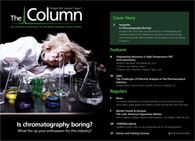Turnkey MS methods
The Canadian National Research Council?s Institute for Marine Biosciences (NRC-IMB) has signed an agreement with AB SCIEX that will enable researchers worldwide to benefit from the insitute?s experience in the detection and identification of marine and freshwater biotoxins and the creation of certified reference materials.
The Canadian National Research Council’s Institute for Marine Biosciences (NRC-IMB) has signed an agreement with AB SCIEX that will enable researchers worldwide to benefit from the insitute’s experience in the detection and identification of marine and freshwater biotoxins and the creation of certified reference materials.
Dr Michael Quilliam and researchers in the institute’s Certified Reference Material programme are aiming to incorporate methods for the comprehensive analysis of marine and freshwater biotoxins into AB SCIEX’sLC–MS–MS system workflows. The experimental parameters and data they collect will be integrated with the company’s Cliquid software to produce automated ‘turnkey’ methods and workflows. According to the institute, these methods and the associated reference materials will enable researchers to easily screen shellfish and freshwater samples for the presence of toxins.
A QTRAP 5500 system has recently been installed at NRC-IMB. According to the company, the system has the capability to gather both qualitative and quantitative information in the same analytical run. The methods, data and CRMs produced at the institute will help further the ability of the QTRAP system to detect and identify toxins and determine their concentrations in a given sample.
This story originally appeared in The Column. Click here to view that issue.
New Study Reviews Chromatography Methods for Flavonoid Analysis
April 21st 2025Flavonoids are widely used metabolites that carry out various functions in different industries, such as food and cosmetics. Detecting, separating, and quantifying them in fruit species can be a complicated process.












